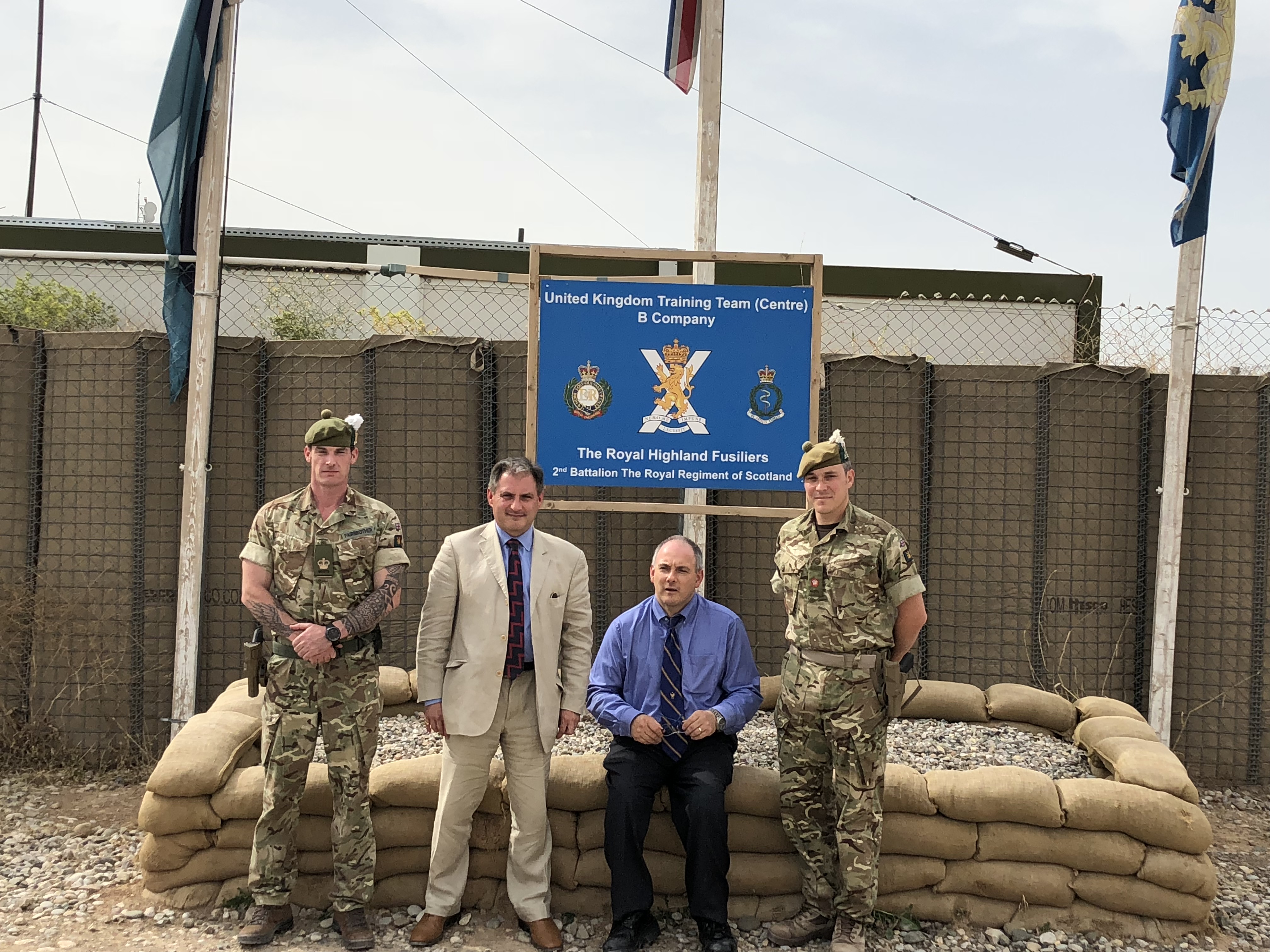Jack Lopresti MP (left) and Robert Halfon MP (right) with UK soldiers who are training the Peshmerga in Kurdistan.
Relations between the Kurdistan Region and the federal government in Baghdad are looking up after a dire year in which the former Iraqi Prime Minister blockaded Kurdistani airports and sought but failed to dissolve the Kurdistan Regional Government in Erbil.
Relations between Erbil and Baghdad have always been poor given decades of discrimination, second class citizenship, and even a genocide, officially recognised by the British parliament. Nearly 200,000 Kurds were eliminated and many will remember the dreadful attack on the town of Halabja by Iraqi jets carrying chemical weapons and in which 5,000 people died almost instantly. Several thousand villages were also razed to the ground.
The Kurdistan Region, which had been protected by Western aircraft from an uprising in 1991 following Saddam Hussein’s defeat in Kuwait, decided to rejoin Iraq on the strict condition that things would be different. Their rights were protected in theory but less and less so in practice by the provisions of the new Iraqi federal constitution agreed in a referendum across Iraq in 2005.
The neglect of federalism and especially the decision to completely cut off all fiscal federal transfers to Kurdistan in 2014 gave impetus to a drive for negotiated independence. This was endorsed by 93% of the Kurds in a peaceful referendum in September 2017, which I and colleagues from the APPG officially observed in Erbil, Kirkuk and Slemani. The central problem is that the Kurdistan Region is landlocked and neighbouring powers are more or less hostile to statehood.
The Prime Minister, who ordered the isolation of Kurdistan and then offensive operations, lost office in parliamentary elections in May 2018. His successor says he is committed to resolving all outstanding issues and has made a very good start with an agreement concerning the export of stranded oil from the disputed province and city of Kirkuk.
For the last year, about $8 billion worth of oil has either been trucked to Iran, in relatively small quantities or remained in the ground. Erbil and Baghdad have now agreed that some oil can be piped via the KRG’s pipeline to Turkey and then beyond.
If this means a wider settlement that respects a strong KRG within a unified Iraq then the impetus for independence will fade. Desperation not dogma drove independence and it remains a right in international law.
In the meantime, the Kurds need to urgently address their chronic internal problems. I’d be the first to acknowledge that they have made huge advances, some of which I have seen in my three visits in the last few years.
They deserve unalloyed praise for fully respecting religious minorities such as the Christians. They have done much to improve the status of women. They have made great sacrifices in looking after huge numbers of Syrian refugees and displaced people from Mosul, at a great cost to their budget and public services. They were also decisive in defeating our common enemy, Daesh. They are open-minded and outward looking and have turned many enemies into friends.
But there are several big buts. Their economy relies massively on oil revenues and state employment. Many of these jobs are unproductive and flow from serving the interests of state-parties which reward and sustain their supporters. The private sector is under-developed and opportunities for private businesses in agriculture, tourism and light industry are often talked about but lack momentum. Corruption is a theft of public resources and needs to be stamped out.
All this is the subject of open discussion in Kurdistan. The old leadership has done much to improve Kurdistan in the last generation but a large cohort of youth wants more than resting on the laurels of unfinished successful reform. They seek a modern, democratic, citizen-based economy and politics and that means tackling vested interests.
Kurds understand this and want to pull themselves up by their bootstraps and stand on their own two feet. I was bowled over by a meeting in Parliament where the Secretary had assembled MPs from many parties and ethnic and religious groups to meet us. They announced they were setting up an APPG on the UK and that would be a vehicle for us to organise a skills transfer programme.
Westminster of course doesn’t have all the answers but that MPs want to learn from us how to do their job better is a significant down-payment. Kurdistan enjoys great security, is a beautiful country that could be a magnet for tourism, is profoundly hospitable and keen to overcome its legacies of war, genocide and be a bulwark against any further rekindling of extremism.
They have come a long way, need to go much further. My hope is that the deal on stranded oil prefigures a lasting settlement that can enable the Kurds, for the first time, to thrive in what has so long been a cold house for them. That is a priority of British foreign policy and I want more British MPs and citizens, especially investors and public bodies such as universities, to play a part in that success story. A truly federal and equal Iraq can benefit the Kurds and revive Iraq as a whole.
Jack Lopresti is Chairman of the APPG on the Kurdistan Region in Iraq, and MP for Filton and Bradley Stoke.


